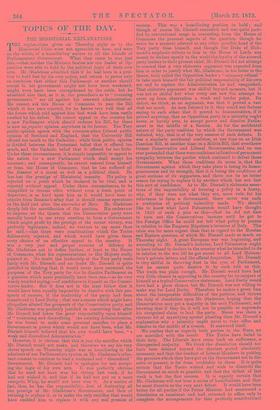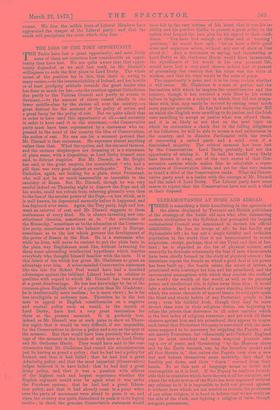TOPICS OF THE DAY.
THE MINISTERIAL EXPLANATIONS.
THE explanations given on Thursday night as to the Ministerial Crisis were not agreeable to hear, and were on the whole, of a humiliating nature to all the friends of Parliamentary Government. What they came to was just this,—that neither the Minister beaten nor the leader of Op- position were able to hold by the political logic of their own acts. Mr. Gladstone admitted that if he had been in a posi- tion to hold fast by his own policy, and return to power only on condition that either this Parliament or another should accept it, his government might not have been weakened, might even have been strengthened by the crisis, but he admitted also that, as it is, the precedents as to " resuming governments " are all against his renewed administration. He cannot ask this House of Commons to pass the Bill which it has once rejected, for he knows very well that all the forces which told against him last week have been vastly swelled by his defeat. He cannot appeal to the country for a new Parliament which should endorse his Bill, for there is now no popular opinion anywhere in its favour. The Tory public opinion agrees with the common-place Liberal public opinion of Scotland and England, that the University Bill offered too much to the Catholics ; while Irish public opinion is divided between the Protestant belief that it offered too much, and the Catholic belief that it offered far too little. Under these circumstances, it is simply impossible to appeal to the nation for a new Parliament which shall accept his measure ; and consequently, he cannot conceal from himself or from the House of Commons, that he has suffered all the disaster of a moral as well as a political check. He has lost the prestige of Ministerial tenacity. His policy is rejected on a point which he declared to be vital, and is rejected without appeal. Under these circumstances, to be compelled to resume office without even a fresh point of departure, is as hard upon him as it would have been to require from Bazaine's army that it should resume operations in the field just after the surrender of Metz. Mr. Gladstone deeply felt the mortification of the position. His endeavour to impress on the Queen that the Conservative party were morally bound to use every exertion to form a Government which might profit by the prestige of the recent victory, was perfectly legitimate ; indeed, we venture to say more than he said,—that there were combinations which the Tories deliberately rejected, and which would have given them every chance of an effective appeal to the country. It was a very just and proper exercise of delicacy in Mr. Gladstone not to define further, at least to the House of Commons, what his representations to Her Majesty really pointed at. No doubt the leadership of the Tory party rests faiily with Mr. Disraeli, and no doubt Mr. Disraeli is quite justified in thinking that it would never have answered the purposes of the Tory party for hint to dissolve Parliament on a question which must practically have been one,—as he very wisely avoided saying,—of confidence in himself as the Conser- vative leader. But it does not in the least follow that it would have been equally impossible to dissolve with fair pro- spects of success, if the leadership of the party had been transferred to Lord Derby ; that was a course which might have altogether altered the prospects of the Conservative party, and Mr. Gladstone was perfectly justified in conceiving that after Mr. Disraeli had taken the great responsibility upon himself of " weakening and discrediting " the existing Administration, he was bound to make some personal sacrifice to place a Government in power which would not have been, what Mr. Disraeli himself believed that his own would have been, " a weak and discredited Administration."
However, it is obvious that this is just the sacrifice which Mr. Disraeli would not make, and therefore we say his very clever speech on Thursday night was as humiliating to the admirers of our Parliamentary system as Mr. Gladstone's reluc- tant consent to continue to lead a weakened and " discredited " Government. Mr. Disraeli had to apologise for not accept- ing the logic of his own acts. It was perfectly obvious that he need not have won his victory last week, if he had not wished it, and that if he had not put on a most energetic Whip, he would not have won it. As a matter of fact, then, he has the responsibility, first, of destroying all the prestige of Mr. Gladstone's Government, and then of refusing to replace it, or to make the only sacrifice that would have enabled him to replace it with any real promise of success. This was a humiliating position to hold ; and though of course Mr. Disraeli concealed, and was quite justi- fied by conventional usage in concealing, from the House of Commons the personal aspects of the question, though he never for a moment referred to any other possible head of the Tory party than himself, and though the Duke of Rich- mond's emphatic tribute to him in the House of Lords was meant to declare openly to the world the loyalty of the avowed. party leaders to their present chief, Mr. Disraeli did not attempt to conceal that a very elaborate argument was expected from, him in order to justify what Mr. Gladstone, in his letter to the Queen, truly called the Opposition leader's "summary refusal to take upon himself the fair political responsibility of his owns act and to replace the Administration he had vanquished.
That elaborate argument was skilful beyond measure, but it was not so skilful but what every one saw the attempt to up from observation a weak and tender point. Its defect, we think, as an argument, was that it proved a vast deal too much. As men listened to it, they could not forbear saying to each other that it proved to demonstration, if it proved anything, that an Opposition party in a minority ought never, or hardly ever, to accept power and dissolve Parlia- ment in the middle of a Session. As for the accidental nature of the party coalition by which the Government was
defeated, why, that is of the very essence of such defeats. It
was a similarly accidental coalition, at one time on an Irish Coercion Bill, at another time on a Militia Bill, that overthrew former Conservative and Liberal Governments, and no one ever pretended that these were coalitions indicative of permanent sympathy between the parties which coalesced to defeat those- Governments. What these coalitions do mean is, that the Government against which they take place is losing its homo- geneousness and its strength, that it is losing the confidence of great sections of its supporters, and there can be no better reason for trying to replace it by another which has not lost this sort of confidence. As to Mr. Disraeli's elaborate asser- tions of the impossibility of forming a policy in a hurry,. why, if they were not what they are, mere veils for his reluctance to form a Government, there never was such a confession of politidal imbecility made. We should like to know what Lord Palmerston would have thought
in 3 869 of such a plea as this—that he did not dare to turn out the Conservatives because until he got to the Foreign Office he could not tell what policy to pursue _
in relation to the Emperor Napoleon's invasion of Italy. The crisis was far more urgent than that in regard to the Russian and Eastern question, of which Mr. Disraeli made so much or Thursday night. A great European war was beginning, and according to Mr. Disraeli's doctrine, Lord Palmerston ought to have refused to declare to the country what he intended to do in relation to the war till he got access to all Lord Malmes- bury's private letters and the official despatches. Mr. Disraeli is very skilful in throwing dust in the eyes of Parliament, but he cannot quite deceive it by such talk as this. The truth was plain enough. Mr. Disraeli would have had very little chance in appealing to the country for its support of himself as a typical Conservative statesman. Lord Derby would have had a great chance, but Mr. Disraeli was not willing to make way for Lord Derby. Therefore he makes a great fuss about the insuperable difficulties of the position, and throws the duty of dissolution upon Mr. Gladstone, hoping that the Conservatives may get a majority in the next Parliament, and knowing that if they do, it will not be possible to supersede his recognised claim to lead the party. Never was there a cleverer bit of mystifying special pleading than Mr. Disraeli's explanation why a minority ought never to take office and dissolve in the middle of a session. It answered itself.
We confess that as regards both parties in the State, we are mortified with the result. The Tories have failed in their duty. The Liberals have come back on sufferance, a disorganised majority. We think the dissolution should not have been delayed beyond the shortest period absolutely necessary, and that the conduct of Liberal Members in putting the pressure which they have put on the Government not to dis- solve at present, is far from creditable to them. It is quite certain that the Tories wished and wish to discredit the Government as much as possible, and that the defeat of last week is but the first success. It is equally certain that Mr. Gladstone will not bear a series of humiliations, and that he must dissolve on the very next defeat. It would have been better for all parties if the Prime Minister had announced a dissolution as imminent and had returned to office only to complete the arrangements for that perfectly constitutional course. We fear the aggravated the danger result will precipitate the



































 Previous page
Previous page